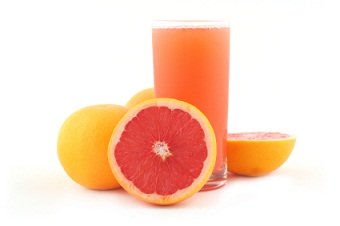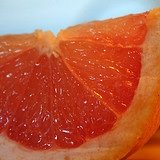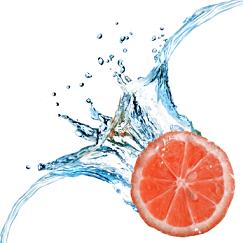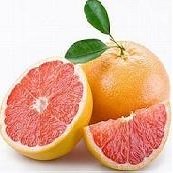Grapefruit Nutrition Facts,
Health Benefits of Grapefruit
All about grapefruit nutrition, grapefruit calories and grapefruit nutrients, nutritional benefits of grapefruit
When buying grapefruit, buy the pink variety. Why? Well pink grapefruit has 27 more times beta-carotene than the white variety. Grapefruit consumption can benefit you in many ways. The health benefits of grapefruit are the following:
Grapefruit and weight loss: Calories in grapefruit are low so you can eat the fruit without fear of consuming too many calories. They are almost fat free. The pectin they contain lowers blood cholesterol and reduces arterial plaque. A 1% reduction in cholesterol cuts the risk of heart disease by 2%, it’s believed. They are also low in sodium which helps you to lose water weight fast, which is caused by high sodium foods.
Grapefruits are full of fat
burning enzymes and high in potassium, more potassium than most berries.
They have a high water content, about 90% of the fruit is water, and
therefore boosts your metabolism naturally to give you more energy.
Grapefruit
removes and dissolves calcium deposits formed as a result of white
flour product consumption in the cartilage of the joints, which causes
arthritis.
Grapefruits are high in vitamin C and lycopene.
Therefore one of the many benefits of a grapefruit diet is as an immune
booster, to reduce the incidence of colds and fever. Other grapefruit
benefits include improving your food digestion and cleansing your gall
bladder. It can be used as an antiseptic for external wounds.
Compare grapefruit nutrition facts to the other fruits.

Grapefruit Nutritional Value
| Grapefruit nutritional value per 100 g (3.5 oz) Refuse: 50% (Peel, seeds, core, and membrane) Scientific Name: Citrus paradisi |
|||
|---|---|---|---|
| Proximates: | |||
| Nutrients | Grapefruit, raw, pink and red and white, all areas | Grapefruit juice, white, raw | Grapefruit juice, pink, raw |
| Water | 90.89 g | 90.00 g | 90.00 g |
| Energy | 134 kJ (32 kcal) | 163 kJ (39 kcal) | 163 kJ (39 kcal) |
| Protein | 0.63 g | 0.50 g | 0.50 g |
| Carbohydrates | 8.08 g | 9.20 g | 9.20 g |
| Total Fat: | 0.10 g | 0.10 g | 0.10 g |
| Fiber | 1.1 g | 0.1 g | 0.1 g |
| Cholesterol | 0 mg | 0 mg | 0 mg |
| Minerals: | |||
| Calcium, Ca | 12 mg (1.2 %) | 9 mg (1%) | 9 mg (1%) |
| Iron, Fe | 0.09 mg (0.5 %) | 0.20 mg (1%) | 0.20 mg (1%) |
| Magnesium, Mg | 8 mg (2 %) | 12 mg (3%) | 12 mg (3%) |
| Phosphorus, P | 8 mg (1 %) | 15 mg (2%) | 15 mg (2%) |
| Potassium, K | 139 mg (3 %) | 162 mg (5%) | 162 mg (5%) |
| Sodium, Na | 0 mg (0 %) | 1 mg (0%) | 1 mg (0%) |
| Zinc, Zn | 0.07 mg (0.5 %) | 0.05 mg (0%) | 0.05 mg (0%) |
| Copper, Cu | 0.047 mg (2 %) | 0.033 mg (2%) | 0.033 mg (2%) |
| Manganese, Mn | 0.012 mg (1 %) | 0.020 mg (1%) | 0.020 mg (1%) |
| Selenium, Se | 0.3 mcg (0.4 %) | 0.1 mcg (0%) | 0.1 mcg (0%) |
| Vitamins: | |||
| Vitamin C | 34.4 mg (57 %) | 38 mg (63%) | 38 mg (63%) |
| Thiamine (Vit. B1) | 0.036 mg (2.4 %) | 0.040 mg (3%) | 0.040 mg (3%) |
| Riboflavin (Vit. B2) | 0.020 mg (1 %) | 0.020 mg (1%) | 0.020 mg (1%) |
| Niacin (Vit. B3) | 0.250 mg (1 %) | 0.200 mg (1%) | 0.200 mg (1%) |
| Pantothenic acid (B5) | 0.283 mg (3 %) | 0.189 mg (2%) | 0.189 mg (2%) |
| Vitamin B6 | 0.042 mg (2 %) | 0.044 mg (2%) | 0.044 mg (2%) |
| Folate (Vit. B9) | 10 mcg (3 %) | 10 mcg (3%) | 10 mcg (3%) |
| Vitamin A | 927 IU (19 %) | 10 IU (0%) | 440 IU (9%) |
| Vitamin E | 0.13 mg (1 %) | 0.22 mg (1.5%) | 0.22 mg (1.5%) |
| Percentages are relative to US Recommended Daily Intake (RDI) for adults. | |||
Author: Lana Soko
You Might Also Like:
Like This Page?
|
Share This Page:
|
Search Our Site:

Free E-Book:
We Recommend:
Looking to get your body into great shape? Get the very best results for your efforts and money! Save your valuable time from surfing the internet. These are theBestselling Weight Loss Programs

Programs that work and have thousands of satisfied customers worldwide!

 |




